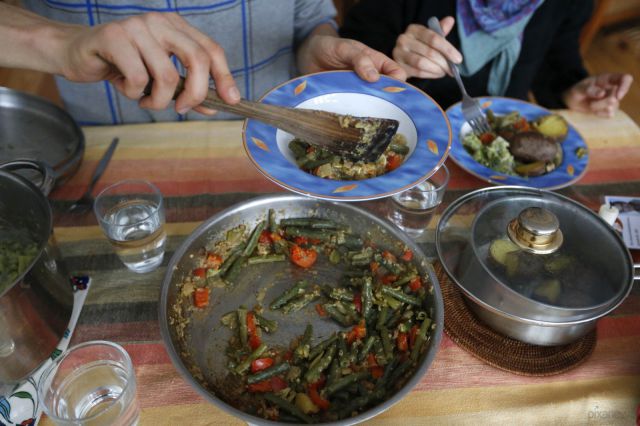
There is also a mobile app for those on the move and designated pre-determined meeting places for those who do not go online but still want to share food. By doing this, they hope to lower the environmental impact of waste as well as help feed people in poorer countries.
1.
izzimyfizzi 12 year s ago
Fkn cheapskate!
I guess when they get food poisoning, they'll think twice about scavenging.
I guess when they get food poisoning, they'll think twice about scavenging.
2.
Mr. Ree 12 year s ago
There's a reason that food is in the garbage. Most of it is expired or damaged so that it is unsalable.
This guy is a lazy piece of shit pretending to be an 'environmentalist'. Are you sure this isn't in the USA?
.
This guy is a lazy piece of shit pretending to be an 'environmentalist'. Are you sure this isn't in the USA?
.
3.
crispy 12 year s ago
No, if he was in the USA, he'd just band together with other Democrats and vote himself more of our money...
4.
gigantes 12 year s ago
red states are the biggest debt-ridden recipients of federal funds out of all states in the union.
not that i have anything against the good 'ol reds and good ol' boys. but look it up sometime if you feel like.....
not that i have anything against the good 'ol reds and good ol' boys. but look it up sometime if you feel like.....
5.
gigantes 12 year s ago
"expired or damaged?" a lot of that food is still perfectly good, perfectly safe, and perfectly usable.
this guy is a boss, IMO. he's brave enough to throw off the bullshit judgementalism of the privileged and self-righteous... brave enough to see an opportunity, go for it, and stand up for something useful.
this guy is a boss, IMO. he's brave enough to throw off the bullshit judgementalism of the privileged and self-righteous... brave enough to see an opportunity, go for it, and stand up for something useful.
6.
Mr. Ree 12 year s ago
@gigantes - I disagree. As someone who used to be a partner in a grocery chain, food that is salable doesn't get thrown out. It will get marked down or sold to farmers for livestock food or pet food manufacturers. This guy is eating garbage and if you think that's so admirable, why don't you try it, you know...
"throw off the bullshit judgementalism of the privileged and self-righteous... brave enough to see an opportunity, go for it, and stand up for something useful."
.
"throw off the bullshit judgementalism of the privileged and self-righteous... brave enough to see an opportunity, go for it, and stand up for something useful."
.
7.
gigantes 12 year s ago
@mr. ree,
because your idea of "salable" or "usable" doesn't necessarily mean anything in the real world.
and yes, i did indeed try it back when i was younger, went about it very carefully, and suffered no ill-effects that i know of. thanks for your kind offer, though.
because your idea of "salable" or "usable" doesn't necessarily mean anything in the real world.
and yes, i did indeed try it back when i was younger, went about it very carefully, and suffered no ill-effects that i know of. thanks for your kind offer, though.
8.

Fats-T 12 year s ago
@ Mr Ree Ree and Gigantes:
Its pretty funny that you guys are fighting as both are right. I too have experience in grocery retail, I managed an independent store while in university. I know it doesn't stack up volume wise to the giants but the basics are all the same.
Meat and dairy products have "expiry dates" as they do become spoiled and dangerous within a few days or weeks. Those would get thrown out and should stay there. Fruits and vegetables can be marked down but often get tossed if there is a large quantity that goes off at once or it is difficult to clean out the bad ones, eg. in a box of blueberries. If it isn't mouldy then it can be used and even if it is the mouldy bits can be cut away and the rest cooked. This is done frequently by food producers making jams, juices, sauces, soups and other cooked and processed vegetable products.
With dry food there is a "best before" date that is often confused with an expiry date. Keep in mind that these dates have only been in wide spread use for about 30-40 years or so (ask your grandma). The difference is that dry, canned, or preserved products don't spoil on the date, instead they lose their freshness as time goes on and producers want to ensure that the consumer gets a fresh tasting product. Many of these products will eventually become unsafe to eat but it is a long time past the best before date. Many suppliers take back their unsold supply to make sure that the products at the store are always fresh. Other suppliers don't care or the cost is not worth the hassle and leave it up to the retailer to dispose of. In some cases the retailers will put it on mark down or clearance but others will toss it in the trash. It really depends on the store's policy.
Having all that said, I tend to agree with Gigantes here. A lot of that food is still perfectly good for human consumption and could fair much better being donated to the local food bank (which is what the people in the post are also arguing). Even stuff like milk and meat are USUALLY (not always) ok for a few months if frozen by the best before date and used immediately after thawing. But it is a huge liability for retailers if someone gets sick, especially in the US where you can sue someone for stepping on your toe accidentally.
Anyway, those who know this will fair much better after the Zombie apocalypse. For the rest of you who are to picky, well, I hope you like braaaaiinnnssss...... lol!
Its pretty funny that you guys are fighting as both are right. I too have experience in grocery retail, I managed an independent store while in university. I know it doesn't stack up volume wise to the giants but the basics are all the same.
Meat and dairy products have "expiry dates" as they do become spoiled and dangerous within a few days or weeks. Those would get thrown out and should stay there. Fruits and vegetables can be marked down but often get tossed if there is a large quantity that goes off at once or it is difficult to clean out the bad ones, eg. in a box of blueberries. If it isn't mouldy then it can be used and even if it is the mouldy bits can be cut away and the rest cooked. This is done frequently by food producers making jams, juices, sauces, soups and other cooked and processed vegetable products.
With dry food there is a "best before" date that is often confused with an expiry date. Keep in mind that these dates have only been in wide spread use for about 30-40 years or so (ask your grandma). The difference is that dry, canned, or preserved products don't spoil on the date, instead they lose their freshness as time goes on and producers want to ensure that the consumer gets a fresh tasting product. Many of these products will eventually become unsafe to eat but it is a long time past the best before date. Many suppliers take back their unsold supply to make sure that the products at the store are always fresh. Other suppliers don't care or the cost is not worth the hassle and leave it up to the retailer to dispose of. In some cases the retailers will put it on mark down or clearance but others will toss it in the trash. It really depends on the store's policy.
Having all that said, I tend to agree with Gigantes here. A lot of that food is still perfectly good for human consumption and could fair much better being donated to the local food bank (which is what the people in the post are also arguing). Even stuff like milk and meat are USUALLY (not always) ok for a few months if frozen by the best before date and used immediately after thawing. But it is a huge liability for retailers if someone gets sick, especially in the US where you can sue someone for stepping on your toe accidentally.
Anyway, those who know this will fair much better after the Zombie apocalypse. For the rest of you who are to picky, well, I hope you like braaaaiinnnssss...... lol!
9.

Fenrisulven 12 year s ago
In the western world, the stores throw away huge amounts of good food because of the smallest problems. This is because the customers expects perfection and good expiring dates on the stuff in the shelf's. Expiring dates are set really strictly to ensure the quality of the product till it expires. Most products can be eaten for some times after this date, but not all, and how the product have been stored matters. Kudos to this guy! I guess he can see and smell the difference between edible and bad food.


I guess when they get food poisoning, they'll think twice about scavenging.
This guy is a lazy piece of shit pretending to be an 'environmentalist'. Are you sure this isn't in the USA?
.
not that i have anything against the good 'ol reds and good ol' boys. but look it up sometime if you feel like.....
this guy is a boss, IMO. he's brave enough to throw off the bullshit judgementalism of the privileged and self-righteous... brave enough to see an opportunity, go for it, and stand up for something useful.
"throw off the bullshit judgementalism of the privileged and self-righteous... brave enough to see an opportunity, go for it, and stand up for something useful."
.
because your idea of "salable" or "usable" doesn't necessarily mean anything in the real world.
and yes, i did indeed try it back when i was younger, went about it very carefully, and suffered no ill-effects that i know of. thanks for your kind offer, though.
Its pretty funny that you guys are fighting as both are right. I too have experience in grocery retail, I managed an independent store while in university. I know it doesn't stack up volume wise to the giants but the basics are all the same.
Meat and dairy products have "expiry dates" as they do become spoiled and dangerous within a few days or weeks. Those would get thrown out and should stay there. Fruits and vegetables can be marked down but often get tossed if there is a large quantity that goes off at once or it is difficult to clean out the bad ones, eg. in a box of blueberries. If it isn't mouldy then it can be used and even if it is the mouldy bits can be cut away and the rest cooked. This is done frequently by food producers making jams, juices, sauces, soups and other cooked and processed vegetable products.
With dry food there is a "best before" date that is often confused with an expiry date. Keep in mind that these dates have only been in wide spread use for about 30-40 years or so (ask your grandma). The difference is that dry, canned, or preserved products don't spoil on the date, instead they lose their freshness as time goes on and producers want to ensure that the consumer gets a fresh tasting product. Many of these products will eventually become unsafe to eat but it is a long time past the best before date. Many suppliers take back their unsold supply to make sure that the products at the store are always fresh. Other suppliers don't care or the cost is not worth the hassle and leave it up to the retailer to dispose of. In some cases the retailers will put it on mark down or clearance but others will toss it in the trash. It really depends on the store's policy.
Having all that said, I tend to agree with Gigantes here. A lot of that food is still perfectly good for human consumption and could fair much better being donated to the local food bank (which is what the people in the post are also arguing). Even stuff like milk and meat are USUALLY (not always) ok for a few months if frozen by the best before date and used immediately after thawing. But it is a huge liability for retailers if someone gets sick, especially in the US where you can sue someone for stepping on your toe accidentally.
Anyway, those who know this will fair much better after the Zombie apocalypse. For the rest of you who are to picky, well, I hope you like braaaaiinnnssss...... lol!